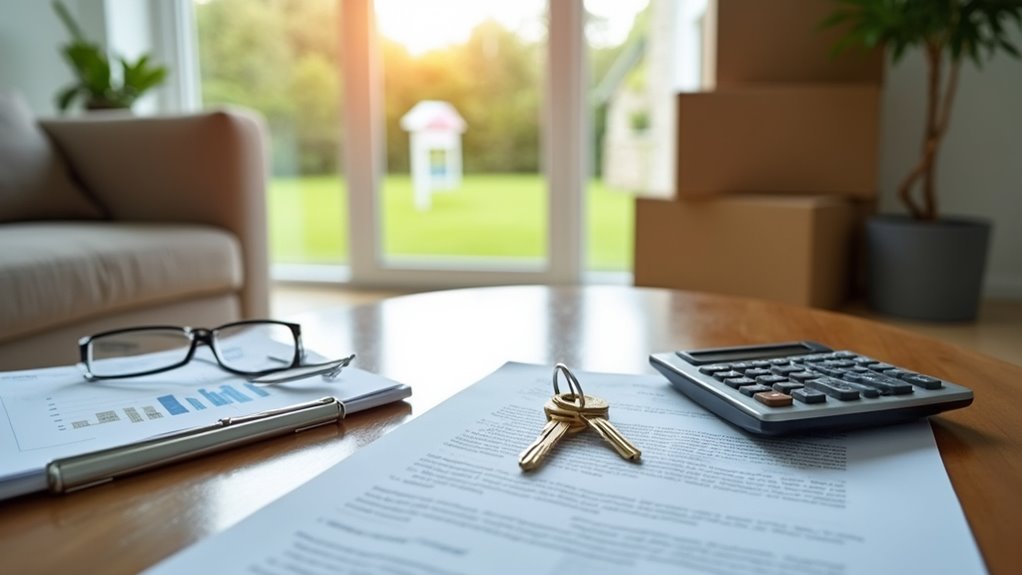
Table of Contents
Selling a rental property can be exciting, but taxes can take a big bite out of your profits. Capital gains taxes and depreciation recapture often surprise owners who want to cash out. Many investors find their returns much lower than expected because of these hidden costs.
These tax bills can quickly shrink your net gains. If you are not prepared, you might lose up to 20% to capital gains taxes and even more from depreciation recapture. Without a plan, you could walk away with much less than you deserve.
Understanding capital gains taxes and how they affect selling rental property is the key to protecting your investment. You need to know how the IRS calculates your tax bill and what strategies can lower it. Careful planning helps you keep more of your hard-earned money. This blog will explain the rules and show ways to reduce your taxes when selling rental property.
Key Takeaways
- Capital gains taxes apply to the profit from selling rental property, calculated as the sale price minus the adjusted cost basis.
- The length of property ownership determines if gains are taxed at higher short-term or lower long-term capital gains rates.
- Depreciation claimed during ownership is recaptured and taxed separately, often at a higher rate up to 25%.
- Accurate recordkeeping of purchase price, improvements, and depreciation is essential to correctly calculate and minimize taxable gain.
- Tax strategies like 1031 exchanges or offsetting losses can help defer or reduce capital gains tax liability on the sale.
Understanding Capital Gains Tax Basics

Capital gains tax applies when you make a profit from selling a rental property. You pay tax on the difference between what you paid and what you receive. The IRS uses this amount to decide how much tax you owe.
Your adjusted basis starts with your purchase price. You add the cost of improvements and subtract depreciation. This number helps you find your real gain. Before selling, it might be helpful to understand options like get a cash offer in as little as 20 minutes if you want to simplify the process.
Accurate property valuation is important for this tax calculation. Mistakes in property value can lead to paying too much or too little tax. If you make errors, you might face audits or penalties.
You must follow IRS rules for reporting the sale. If you qualify for certain deductions, you can lower your tax bill. Always check your records and schedules to ensure everything is correct. If you’re facing a complex situation like inherited the house, selling a rental property can involve additional tax implications, so be sure to review your unique circumstances carefully.
Short-Term vs. Long-Term Capital Gains
You need to consider the holding period when selling rental property, as it determines whether your gain is classified as short-term or long-term. If you own the property for one year or less, the gain is taxed at higher ordinary income rates, while holding it longer typically qualifies you for preferential long-term capital gains rates.
These distinctions can significantly impact your net proceeds, so understanding the applicable thresholds is essential. For a smoother transaction, you might benefit from a hassle-free transaction when working with a reputable cash buyer. If you’re looking to avoid the hassle of listing the house and want a quick sale, working with a cash buyer like Shawn Buys Houses can streamline the process regardless of your capital gains situation.
Holding Period Requirements
The holding period is the length of time you own a rental property before selling it. The IRS uses this period to decide if your capital gain is short-term or long-term. This decision affects the tax rate you will pay on your profit.
If you own the property for one year or less, your gain is short-term. If you hold it longer than one year, your gain is long-term. Long-term gains often have lower tax rates than short-term gains.
The IRS counts your holding period from the day after you buy the property until the day you sell it. You must track this period accurately. If you miscalculate, you could lose tax benefits or face penalties.
Tax Rate Differences
The IRS taxes short-term and long-term capital gains at different rates. Short-term gains come from selling property held for one year or less. These gains are taxed at your regular income rate, which may be as high as 37%.
Long-term gains apply if you sell property held for more than one year. These are taxed at lower rates of 0%, 15%, or 20%, depending on your taxable income. Lower tax rates on long-term gains can help you keep more profit.
If you understand these tax differences, you can plan when to sell your property. Timing your sale could reduce taxes and increase your returns. Proper planning helps you reach your financial goals.
Calculating Your Cost Basis

To calculate your cost basis, you’ll start with the property’s original purchase price and add the cost of any capital improvements made during ownership. Don’t include routine repairs, as only improvements that increase value or extend the property’s life qualify. Accurate records of these adjustments are essential for minimizing your taxable gain.
If you’re considering selling due to difficult situations like horrible tenants or being behind on payments, it’s important to know your cost basis to accurately estimate your potential capital gains tax. You might also qualify for a free no-obligation cash offer if you’re looking to sell quickly and avoid additional complications.
Determining Original Purchase Price
Your original purchase price, also called cost basis, is the amount you paid to buy your rental property. This number is important because it helps you figure out your capital gains when you sell. If you do not calculate it correctly, you might pay more tax than needed.
Cost basis includes more than just what you paid for the property. The IRS says you must also add other costs related to the purchase. These extra costs can affect how much tax you owe later.
You should add title and recording fees, legal and escrow fees, transfer taxes, and survey or inspection fees to your purchase price. These costs together make up your property’s original cost basis. If you keep good records, you can prove your numbers if needed.
Adjusting for Improvements
You must adjust your cost basis if you make major improvements to your property. Improvements include upgrades that add value or extend its life. If you do this, you may lower your capital gains tax.
Only capital improvements count, not regular repairs or maintenance. Examples are new roofs, HVAC systems, or remodeled kitchens. You must keep itemized receipts, invoices, and contracts for proof.
Add the total cost of improvements to your original purchase price. This gives you your adjusted cost basis. If you include all eligible improvements, your tax bill will reflect your true investment.
Sell My Oklahoma House Fast For Cash Now
What Counts as a Capital Gain?
A capital gain is the profit you make when you sell property for more than its adjusted basis. The adjusted basis is your original purchase price plus any improvements, minus any depreciation you claimed. If you do not calculate this correctly, you could pay more tax than needed.
The IRS also looks at how long you owned the property before selling. If you owned it for one year or less, it is a short-term gain. If you held it longer, it is a long-term gain, which usually has a lower tax rate. If you are considering selling quickly for a cash offer on house, understanding capital gains taxes is especially important to avoid surprises.
To figure out your capital gain, start with your sale price. Then, subtract the adjusted basis, which includes improvements and less depreciation. If you keep good records, you can make sure your taxes are right.
If you’re facing challenges like liens & judgements or other complicated situations when selling your property, these factors can also affect your capital gain calculation and overall tax obligations.
Depreciation Recapture and Its Impact

When you sell a rental property, the IRS requires you to address depreciation recapture, which taxes the depreciation deductions you’ve claimed. You’ll need to calculate your recapture tax liability, typically taxed at a maximum federal rate of 25%. Understanding proven strategies to minimize this tax impact can significantly improve your after-tax returns.
If you are behind on taxes or facing other difficult situations with your property, selling quickly to a local buyer may help you address your tax obligations and avoid further financial complications. If you want to avoid complications related to delinquent property taxes, working with a local cash buyer who understands creative solutions can help you close on your timeline and reduce stress.
What Is Depreciation Recapture
Depreciation recapture is a tax rule that applies when you sell a rental property. The IRS taxes the value of all depreciation you claimed during ownership. This amount is taxed separately from your regular capital gains.
The tax rate for recaptured depreciation is usually higher than the long-term capital gains rate. If you sell the property, you must pay this tax on the total depreciation taken. This can reduce the profit you keep after the sale.
If you plan ahead, you may lessen the impact of depreciation recapture. Good tax strategies can help you manage the final tax bill. It is important to know how depreciation recapture will affect your overall tax situation.
Calculating Recapture Tax Liability
Depreciation recapture is a tax you may owe when selling a property. You can calculate this tax using a simple method. Follow these steps to estimate your liability.
First, find the total depreciation you have claimed over the years. Subtract this amount from your property’s original cost to get the adjusted basis. If you sell the property for more than the adjusted basis, the difference is the recaptured amount.
The IRS taxes the recaptured depreciation at up to 25%. Multiply the recaptured amount by 25% to find the tax owed. Use the table below to see each step and the details involved.
This approach helps you forecast your tax bill accurately. If you need to plan for a sale, use these steps before closing. Always check current IRS rules or talk to a tax advisor for updates.
Strategies to Minimize Recapture
Depreciation recapture can raise your tax bill when you sell a rental property. You can use certain strategies to lower or delay this tax. These methods help you keep more of your profit.
A 1031 exchange lets you defer both depreciation recapture and capital gains taxes. This works if you reinvest the sale money into another similar property. If you add qualified improvements to the property, you may increase its basis and reduce the taxable gain.
Selling the property in a year when your income is lower can lower your recapture tax rate. You could also use passive activity losses to offset the tax if you qualify. If you leave the property to heirs, they get a step-up in basis, which removes the recapture tax at your death.
Determining Your Tax Rate

To find your capital gains tax rate, first check if your gain is short-term or long-term. Short-term gains come from property held one year or less. Long-term gains come from property held more than one year.
Short-term gains are taxed as regular income and usually have higher rates. Long-term gains receive lower tax rates, which can reduce your tax bill. If you plan carefully, you may pay less tax by holding your property longer.
Accurate property value and records help you figure out your gain. Depreciation recapture is taxed differently, with a maximum rate of 25%. Use clear records and the table below to understand your tax situation.
If you are facing difficult situations like foreclosure, liens, or unwanted property, understanding your capital gains tax rate can help you make informed decisions when selling your rental property.
Sell My Oklahoma House Fast For Cash Now
Reporting the Sale on Your Tax Return
When you sell rental property, you must complete IRS Form 4797 or Schedule D to report the transaction. You’ll need to calculate your adjusted basis accurately to determine the correct amount of capital gain. Make sure you enter all figures precisely to comply with IRS regulations and avoid penalties.
Required IRS Tax Forms
You need certain IRS forms when you sell your rental property. These forms help you report the sale and any profit or loss. The IRS uses them to check your numbers.
Form 8949 is used to list the sale of your rental property. Schedule D (Form 1040) summarizes all your capital gains and losses. Form 4797 is needed if your rental was used as a business asset.
Form 1099-S is sent by the closing agent and shows how much you received from the sale. You must include this information on your tax return. Form 1040 is your main tax form and will include all other forms.
If you are not sure which forms to use, check the IRS website or ask a tax professional. Missing a form could delay your tax refund or cause problems. Always keep records of your property sale and related costs.
Calculating Adjusted Basis
To find your adjusted basis, start with the original purchase price of your rental property. Add costs like title fees and major improvements. Subtract all depreciation you have claimed over the years.
The adjusted basis shows your actual investment for tax purposes. If you calculate this number carefully, you will report the sale correctly. Always keep clear records of these changes.
Proper documentation helps you avoid mistakes on your tax return. If you follow these steps, you can figure out your capital gain or loss accurately.
Reporting Capital Gain
You must report your capital gain when you sell a rental property. The IRS needs this information for your tax return. Use the correct forms to avoid mistakes.
Start by filling out IRS Form 8949 with your purchase and sale details. Then, transfer the totals to Schedule D. These forms summarize all your capital gains and losses.
Always include depreciation recapture in your calculations. Depreciation recapture is taxed as ordinary income. If you miss this step, you could owe more tax.
Your tax bracket will determine your capital gains tax rate. Make sure you know which bracket you are in. This helps you estimate your tax bill.
Keep all records that support your calculations. Good documentation protects you if the IRS has questions. If you cannot provide proof, you may face penalties.
Primary Residence Exclusion Rules
If you sell your main home, you may not owe capital gains tax. The IRS allows you to exclude up to $250,000 of gain. Married couples filing jointly can exclude up to $500,000.
You must have owned and lived in the home for two out of the last five years. Both the ownership test and the use test must be met. If you do not meet both, you cannot claim the full exclusion.
Periods when you rented out the home can reduce your exclusion. You must track how long you owned and lived in the home. Careful record-keeping helps you use this tax break and lower your tax bill.
1031 Exchange: Deferring Capital Gains

A 1031 exchange lets you delay paying capital gains taxes when selling a rental property. You must use the sale money to buy another investment property. This option is useful if you do not qualify for the primary residence exclusion.
A 1031 exchange lets you defer capital gains taxes by reinvesting the proceeds from selling a rental property into another investment property.
The new property must be similar in type to the one you sold. Both properties need to be used for investment or business. You cannot use this rule for a personal home.
You have 45 days to choose your replacement property. The purchase must be completed within 180 days. Missing these deadlines means you lose the tax benefit.
If you follow all IRS rules, you can defer paying taxes now. This helps your investment keep growing. Make sure to consult a tax professional for guidance.
Using Capital Losses to Offset Gains
You can lower taxes from selling rental property by using capital losses to offset gains. The IRS lets you use losses from other investments, like stocks or bonds, to reduce taxable gains. This process is known as tax loss harvesting.
If you have a $30,000 gain and a $10,000 loss, you pay tax only on $20,000. Capital losses greater than gains can offset up to $3,000 of ordinary income each year. Any leftover losses carry forward to future years.
Strategically using losses helps reduce your total tax bill. This approach can increase your after-tax returns. Always track your investment gains and losses for the best tax outcome.
State Taxes on Capital Gains
States have different rules for taxing capital gains from rental property sales. Some states, like Texas and Florida, do not tax income at all. Others, such as California, have some of the highest state tax rates.
State tax rates can range from 0% to over 13%. Many states count capital gains as ordinary income. Your tax bill will depend on where your property is located.
Residency affects how much state tax you owe. Some states have special rules for non-residents who own property there. You may need to file a state tax return even if you live elsewhere.
Each state has its own filing requirements and rules for deductions or exemptions. Careful tax planning is important to understand your total tax liability. Check state tax codes before selling your rental property.
Planning Ahead to Minimize Tax Liability
Proactive tax planning helps you keep more money when you sell your rental property. You can use certain tax rules and good timing to lower your tax bill. Review your property’s cost basis, how long you have owned it, and your possible profits before selling.
If you sell during a year with lower income, you may pay less capital gains tax. A 1031 exchange lets you delay taxes by buying another similar property. You may also consider gifting the property or using a trust to help your heirs avoid capital gains taxes.
Tax software or a tax advisor can show you how much tax you might owe. If you plan your taxes and estate together, you can make a good exit plan. This helps you meet your long-term financial goals.
Common Mistakes Property Owners Make
Property owners often make mistakes that increase their capital gains tax. These errors can raise your tax bills and cause problems with the tax office. If you own rental property, you should know about these common pitfalls.
Many owners miss out on deductions for property management expenses. Some forget to record capital improvements or depreciation. Others do not report all rental income on their tax returns.
If you ignore how long you hold a property, you may pay more tax. Missing or incomplete records can make it hard to support your claims. Careful recordkeeping helps you avoid extra taxes and possible penalties.
If you pay attention to these details, you can lower your tax liability. Always keep accurate records and learn about the tax rules for property owners. This will help you avoid costly mistakes.
Working With Tax Professionals
Working with tax professionals helps you follow the rules for rental property taxes. They make sure you claim all possible tax deductions. If you want to avoid mistakes, a tax professional is a good choice.
Tax professionals know the latest IRS rules. They can find deductions for things like repairs and depreciation. If you have questions, they give clear answers.
A tax professional helps you figure out your adjusted cost basis. This lets you see your real capital gains. If you plan to sell, they can help you estimate your taxes.
Conclusion
If you plan to sell your rental property, you must consider capital gains taxes and other potential costs. If you ignore tax rules, you could face unexpected expenses later. If you want to keep more of your profits, you should plan ahead and seek professional advice.
If you want a simpler process, we buy houses for cash. If you work with us, you can avoid many complications and close quickly. If you prefer a hassle-free sale, Shawn Buys Houses can help.
If you are ready to sell, reach out to us today. If you want an easy and fast solution, contact Shawn Buys Houses now. We look forward to helping you with your property sale.
